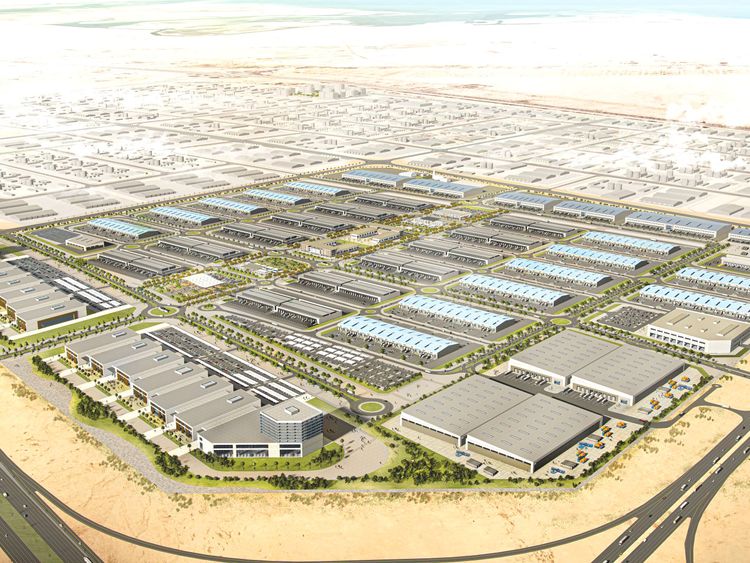Dubai: Secure the food supply chain, and chances are that you will be securing the future. If that means building food hubs at the centre of transportation networks – land, sea and air – then it’s the natural direction to take.
And that’s exactly where Abu Dhabi’s industrial cluster Kezad and JAFZA-headquartered Ghassan Aboud Group are heading with the launch of the Abu Dhabi Food Hub. Gulf News speaks to Graham Sanders, CEO of Abu Dhabi Food Hub – Kezad and Suresh Vaidhyanathan, Group CEO, Ghassan Aboud Group, for a taste of what the new venture is all about.
Will Abu Dhabi Food Hub – Kezad primarily to serve the local market or more of a re-export hub?
Graham Sanders: As the region’s largest multi-category wholesale food trading and logistics hub, Abu Dhabi Food Hub – Kezad will leverage the emirate’s position as a gateway to Asia, Africa, and the MENA region. The scale and ambition of the project will support the UAE’s National Food Security Strategy 2051, help accelerate food trade flow through Abu Dhabi and the UAE, and facilitate increased agriculture in the country.
Abu Dhabi Food Hub is located in close proximity to Khalifa Port and Jebel Ali Port and has direct access to world-class transport connectivity, including three major international airports, congestion-free multi-lane highways, and Etihad Rail’s future rail link.
By bringing together wholesale buyers, sellers, logistics players, consolidators and distributors from across the world, the food hub will enhance the diversity, quality, and quantity of all food categories available for consumers in the UAE and wider region.
Is the Food Hub project a JV? Is this only for fresh produce?
Graham Sanders: Abu Dhabi Food Hub – Kezad is a public-private partnership between AD Ports Group and Ghassan Aboud Group. It is a food trading and logistics hub built to facilitate domestic and international food trade in all food categories from fruits and vegetables, meat, poultry, seafood, dry products, dry commodities, dairy, gourmet products and flowers.
Across 3.3 square kilometres, we are building a ‘Food Ecosystem’ where you can store, pack, trade, finance, customs clear, inspect and move food products across all categories. (And) not just fresh products – all food products.
The Food Hub will be supported by an ecosystem of logistics services providers, government-backed services, and general commercial services, and is set to become the new centre for food trading and logistics in the region.
Would you say that food commodity prices are back to some stability?
Graham Sanders: Shipping prices have recently begun to fall, and this is easing the pricing of some food commodities, however, the inflation effects on food products are very real and widespread.
Our job at the Abu Dhabi Food Hub is to improve logistics efficiencies, reduce food waste and encourage more local food production. We will focus on the things we can improve and help the cost and availability of food.
When will the project in Abu Dhabi go live?
Graham Sanders: The opening timing for the project is yet to be formally announced. However, the project is being fast-tracked by the partners for expeditious completion and is expected to progress rapidly.
Besides being a one-stop-shop, wholesale trading and logistics hub for food commodities, Abu Dhabi Food Hub – Kezad will also drive digital trade through a first-of-its-kind platform that enables e-commerce and inbound-outbound trading formalities, all on a single-window digital platform.
Is this the Ghassan Aboud Group’s first venture into the foodstuffs wholesale market?
Suresh Vaidhyanathan: The food business is one of the Group’s predominant verticals that includes distribution, catering, retail, logistics and digital platforms.
The Abu Dhabi Food Hub – Kezad venture represents the Group’s further foray into the food value chain. The Group is also leveraging its collaboration with Rungis International Market, one of the world’s leading fresh produce wholesale markets in delivering a world-class hub for the UAE. As a greenfield project, we have the unique advantage of designing and building what could be one of the world’s most optimized marketplaces.
Does the Group plan to go ‘upstream’ in the food chain by launching direct farming or investing in farms?
Suresh Vaidhyanathan: The Group has no imminent plans for direct investments into agriculture. However, we are considering opportunities in processing, logistics, technology and value-added services within the food value chain.
Is the food vertical a recent addition to the Group’s interests?
Suresh Vaidhyanathan: The Ghassan Aboud Group has been investing and developing competencies within the food vertical. The food business has emerged as a core business for the Group with its rapidly expanding portfolio of operations in this sector. The Group has aligned itself closely with the UAE’s ambitions for food security associated innovations in this critical industry.



